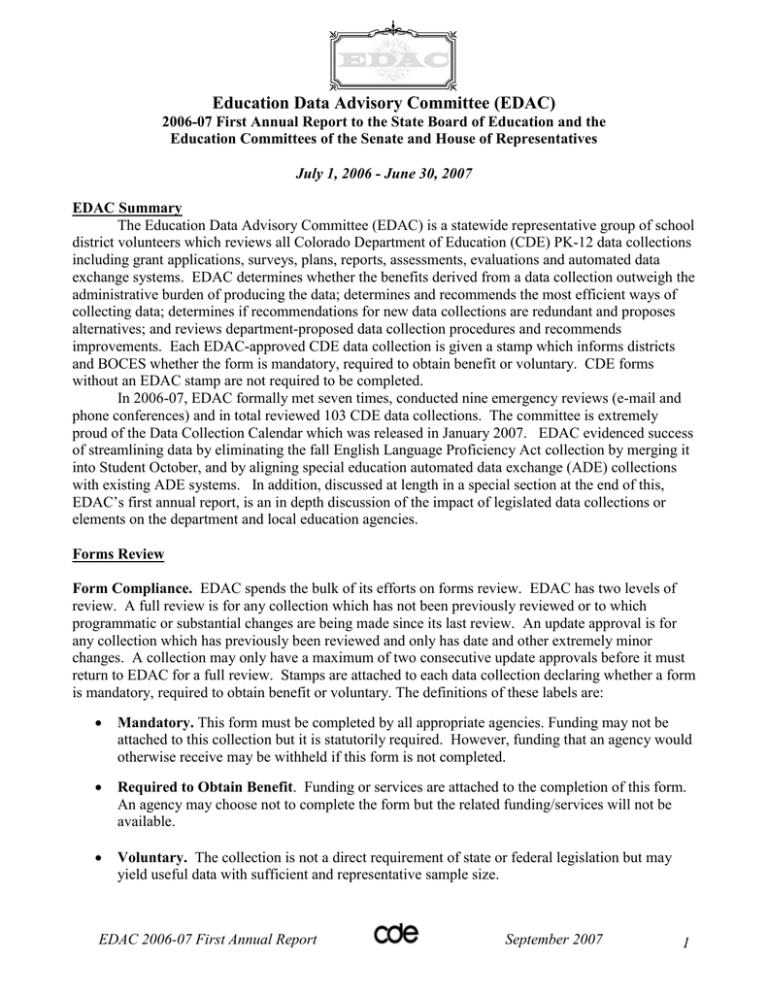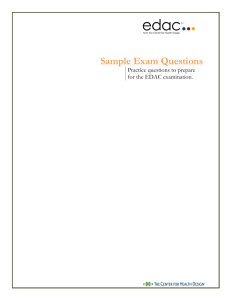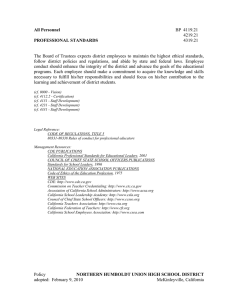EDAC Education Data Advisory Committee (EDAC)
advertisement

EDAC Education Data Advisory Committee (EDAC) 2006-07 First Annual Report to the State Board of Education and the Education Committees of the Senate and House of Representatives July 1, 2006 - June 30, 2007 EDAC Summary The Education Data Advisory Committee (EDAC) is a statewide representative group of school district volunteers which reviews all Colorado Department of Education (CDE) PK-12 data collections including grant applications, surveys, plans, reports, assessments, evaluations and automated data exchange systems. EDAC determines whether the benefits derived from a data collection outweigh the administrative burden of producing the data; determines and recommends the most efficient ways of collecting data; determines if recommendations for new data collections are redundant and proposes alternatives; and reviews department-proposed data collection procedures and recommends improvements. Each EDAC-approved CDE data collection is given a stamp which informs districts and BOCES whether the form is mandatory, required to obtain benefit or voluntary. CDE forms without an EDAC stamp are not required to be completed. In 2006-07, EDAC formally met seven times, conducted nine emergency reviews (e-mail and phone conferences) and in total reviewed 103 CDE data collections. The committee is extremely proud of the Data Collection Calendar which was released in January 2007. EDAC evidenced success of streamlining data by eliminating the fall English Language Proficiency Act collection by merging it into Student October, and by aligning special education automated data exchange (ADE) collections with existing ADE systems. In addition, discussed at length in a special section at the end of this, EDAC’s first annual report, is an in depth discussion of the impact of legislated data collections or elements on the department and local education agencies. Forms Review Form Compliance. EDAC spends the bulk of its efforts on forms review. EDAC has two levels of review. A full review is for any collection which has not been previously reviewed or to which programmatic or substantial changes are being made since its last review. An update approval is for any collection which has previously been reviewed and only has date and other extremely minor changes. A collection may only have a maximum of two consecutive update approvals before it must return to EDAC for a full review. Stamps are attached to each data collection declaring whether a form is mandatory, required to obtain benefit or voluntary. The definitions of these labels are: Mandatory. This form must be completed by all appropriate agencies. Funding may not be attached to this collection but it is statutorily required. However, funding that an agency would otherwise receive may be withheld if this form is not completed. Required to Obtain Benefit. Funding or services are attached to the completion of this form. An agency may choose not to complete the form but the related funding/services will not be available. Voluntary. The collection is not a direct requirement of state or federal legislation but may yield useful data with sufficient and representative sample size. EDAC 2006-07 First Annual Report September 2007 1 One-half (49.5 percent) of forms which EDAC reviewed in 2006-07 are labeled required to obtain benefit. Very few (29.1 percent) are mandatory and even fewer (21.4 percent) are voluntary. If districts or BOCES are interested in securing particular funds or services, then some amount of data collection is associated with the benefits derived. Form Compliance Full Review Update Approvals Total Reviews Mandatory Required to Obtain Benefit Voluntary Total 15 15 30 15 36 51 9 13 22 39 64 103 Review Approval 1 1 0 2 Withheld/Revoked* No Approval Required N/A N/A N/A 2 Informational Briefings N/A N/A N/A 8 * Reasons include dissemination of collection prior to EDAC review or substantial changes to collection/instructions after EDAC approval. Review Outcomes. EDAC is tasked with making recommendations to improve the efficiency and effectiveness of data collection instruments. Very few collections move through the EDAC full review process without some suggestions for improvement. Most are approved with some minor adjustments, others with more detailed issues are invited to resubmit the collection before a stamp is issued, and in extremely rare circumstances, a data collection is not approved because the collection was distributed prior to EDAC review. Approved No Changes Approved With Changes Not Approved Resubmit Not Approved (No stamp issued) Total 44 50 8 1 103 Review Outcomes Review Preparation. EDAC posts its meeting schedule well in advance of the upcoming school year so that CDE staff can schedule an EDAC review as part of their regular routine within their data collections. EDAC must be given the review materials in a timely manner so that members have sufficient time to prepare judicious input to share with the data collector. EDAC acknowledges that in extremely rare circumstances, department data requestors may need to submit reviews during periods for which no regular meetings are scheduled. Emergency conference calls or electronic mail reviews are available because a change in state statute or some unforeseen circumstance occurs which prevents the collection from being presented at a regularly scheduled EDAC meeting. EDAC conducted 22 emergency reviews on nine separate occasions in 2006-07 and is committed to keep these to a minimum in the upcoming school year. **In 2007-08 EDAC will be tracking the timeliness of meeting materials. Meeting Materials Submitted On-Time/Late** Meeting Materials Submitted After Deadline** Emergency Reviews Total 81 N/A 22 103 Review Preparation EDAC 2006-07 First Annual Report September 2007 2 Type of Collection. The majority of EDAC reviews centered on existing CDE data collections. Onefifth (18.4 percent) of the data collections EDAC reviewed in 2006-07 were newly required through legislation or rule. EDAC is making every effort to identify and bring to the table those CDE data requestors who are not yet familiar with the EDAC review process. Type of Collection New Collections Existing Collections On-Schedule Reviews Existing Collections First Time or Delayed Reviews Total Reviews 19 76 8 103 Known Forms NOT Reviewed by EDAC. There were four known CDE data collection forms not reviewed by EDAC in the 2006-07 school year. Each CDE data requestor has been contacted and complete cooperation has been obtained for the upcoming data cycle. Major Accomplishment Released the 2006-07 CDE Data Collection Calendar in January 2007 This calendar displays by month all pertinent EDAC-reviewed collections for the 2006-07 school year. It specifies when each collection starts and is due, and whether each is voluntary, required to obtain benefit or mandatory. The current 2007-08 calendar can be accessed at http://www.cde.state.co.us/cdereval/download/spreadsheet/2007-2008CDEDataCalendar.xls Streamlining Successes English Language Proficiency Act fall data collection was eliminated by obtaining data through 2006 Student October Special Education data collections are being aligned with other Automated Data Exchange (ADE) collections Recommendations for Repeal or Amendment Although there are a few existing suggestions for repeal or amendment of statutory and regulatory data reporting requirements, EDAC does not have a formalized process to address such concerns. EDAC will create a method in the 2007-08 school year and share results within its next annual report. See the fifth bullet under Future Focuses below. Future Focuses Increase awareness of EDAC both internally and externally to the department Expand the automation of CDE data collections Broaden EDAC focus on justification for data collection and fiscal impact to respondents Formally adopt EDAC bylaws Develop a process for recommendations for repeal or amendment Advance the usefulness of EDAC’s Data Collection Calendar Provide input regarding CDE’s Data Dictionary project in accordance with HB07-1320 Concerning Education Data Management Contribute to the comprehensive review of the state’s educational data infrastructure (HB071270) EDAC 2006-07 First Annual Report September 2007 3 Impact of Legislated Data Collections/Elements on CDE and Local Education Agencies When new elements/formulas or entirely new collections are required by legislation or rule, CDE and districts/BOCES must be given adequate time to address the upcoming changes. Appropriate and advance notice is necessary to ensure that data will be available in the format needed. Within the department there is a complex series of tasks that must be completed before new requirements are rolled out to the districts. Specifically within CDE, the collection owner must gather school district/BOCES input regarding current and preferred data collection practices; define file layouts, data elements, definitions, and required edits; obtain EDAC approval; refine system requirements with IMS; train and provide technical assistance; and test the system prior to opening. After the collection owner meets with an IMS programmer/analyst to establish system or maintenance requirements, the programmer/analyst will then generate a Business Feasibility Study and system notebook; create a detailed project plan; perform required programming; develop a test plan and implementation schedule; and finally move the completed system into production. HB 07-1320 Data Reporting and Technology Act codified a schedule for changes in data requirements citing ‘that the department must allow school districts and public schools the necessary time in which to comply with changes in data submission requirements’: Notify school districts, schools and vendors of new federal or state data submission requirements within one business day of passage through an e-mail process CDE conduct informational meetings Update CDE website within 60 days of notice of change Schools districts comply within 90 days of website update State Board has 90 days to promulgate rules after the effective date of the legislation that alters data collection requirements School districts and schools have 90 days to reformat data systems after the publication of the rules Examples of new elements/formulas and new collection impacts are given below. The time span set forth below reflects the amount of time between adoption of the law/rule and the opening of the data collection with all changes intact. As evidenced in the following examples, the amount of time required to implement legislated data changes can vary greatly. In these limited examples the time ranges from as little as eight months to as many as 35 months. New Elements/Formulas Time to Implementation Low Impact: 13 months SB06-055 required a change to the collection categories for the Safety and Discipline Indicators collection High Impact: 35 months SB05-91 resulting in 1 Colorado Code of Regulations 301-67 Rules for the Administration of Colorado Data Reporting for School Accreditation increased the number of reported rates from 3 in 2005-06 to 17 in 2007-08. New Collections Time to Implementation Low Impact: 8 months HB07-1232 Concerning Aid for School Districts for Dependents of Military Personnel requires a February 1 count for impacted districts. High Impact: 24 months HB07-1345 Concerning Modifications to SAR requires a new student course taking data collection. EDAC 2006-07 First Annual Report September 2007 4


